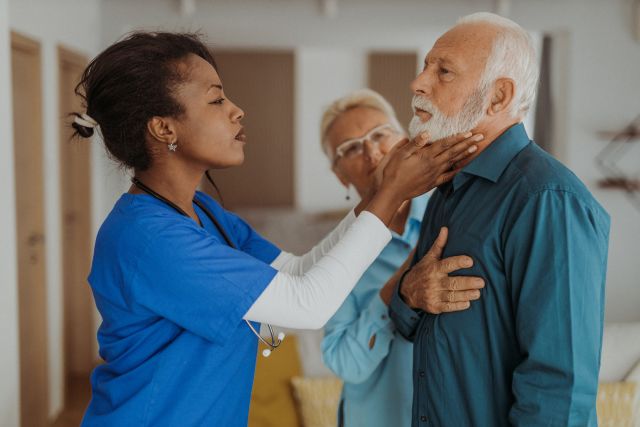Normally, the body's cells grow, divide, and expire in a controlled and scheduled manner—old cells die off and new cells take their place. Cancers occur when genetic mutations disrupt this process, causing the uncontrolled growth and spread of abnormal cells.
There are many different types of cancers. Cancer can develop in nearly any part of the body, and cancers are named for the area of the body where the cancerous cells originate—lung cancer begins in the cells of the lungs, breast cancer begins in breast tissue, lymphomas begin in the lymph system.
What are the symptoms of cancer?
The symptoms of cancer can vary widely depending on many different factors—the type of cancer, its stage, the grade (how abnormal cancer cells appear compared to normal cells), and the type of cell where the cancer originates (called the histological type).
However, there are some signs and symptoms that are common when a person has cancer. These include:
- Fatigue. Unexplained and persistent tiredness that doesn't improve with rest.
- Unintended weight loss. Significant and unexplained weight loss without changes in diet or exercise.
- Pain and/or neurologic symptoms. Persistent pain in a specific area of the body, loss of strength, and other sensations (like numbness or tingling).
- Changes in the skin. Changes in the color, size, shape, or texture of moles or skin lesions.
- Changes in bowel or bladder habits. Persistent changes in bowel movements, urination, or incontinence.
- Lumps or masses. Noticeable lumps or masses in the breasts, testicles, lymph nodes, or other parts of the body.
- Respiratory symptoms. Persistent coughing, hoarseness, difficulty swallowing, or other respiratory symptoms such as difficulty breathing or shortness of breath that is not attributed to other causes.
- Persistent indigestion or discomfort. Long-lasting indigestion, stomach pain, or other types of GI discomfort.
- Unusual bleeding or discharge. Unexplained bleeding (such as blood in urine, stool, or coughing up blood) or unusual discharge from nipples or other openings in the body. Also, bruising easily or bruises with no apparent cause.
- Difficulty swallowing. Trouble swallowing or a feeling that something is stuck in the throat.
- Changes in hearing, vision, and speech. These can be symptoms of a tumor in the brain.
- Skin changes. Changes in the size, shape, color, or texture of existing moles or the appearance of new moles.
- Persistent headaches. Frequent or severe headaches, especially when combined with other symptoms.
- Persistent infections. Frequent infections or infections that take longer than usual to resolve.
Keep in mind that this is not a comprehensive list of symptoms—there are many types of cancer, different cancers can cause many different symptoms, and cancer symptoms can vary—sometimes significantly—from one person to the next.
What to do if you are experiencing cancer symptoms?
If you or a loved one is experiencing any of these symptoms, it’s important to see a healthcare provider for an evaluation and diagnosis. Also know that many symptoms associated with cancer can have other causes that are not cancer. A healthcare provider will always be your best source of information about your health and a specific symptom you are experiencing.
Even if you are not experiencing any obvious symptoms, listen to your body and make note when something new, different, or unexplainable happens.
Is it possible to have cancer with no symptoms?
In many cases, a person can have cancer that is causing no symptoms, or no noticeable symptoms. And in some cases, it’s possible to detect certain cancer (or precancerous cells) before symptoms begin to occur.
Cancer screening refers to tests and exams that seek to detect cancer before it causes symptoms. Generally speaking, the earlier a cancer can be detected, the better the treatment outcome. Cancer screening varies from person to person, and recommendations are dependent on many different factors. A healthcare provider can help you determine what cancers you should screen for and when.






